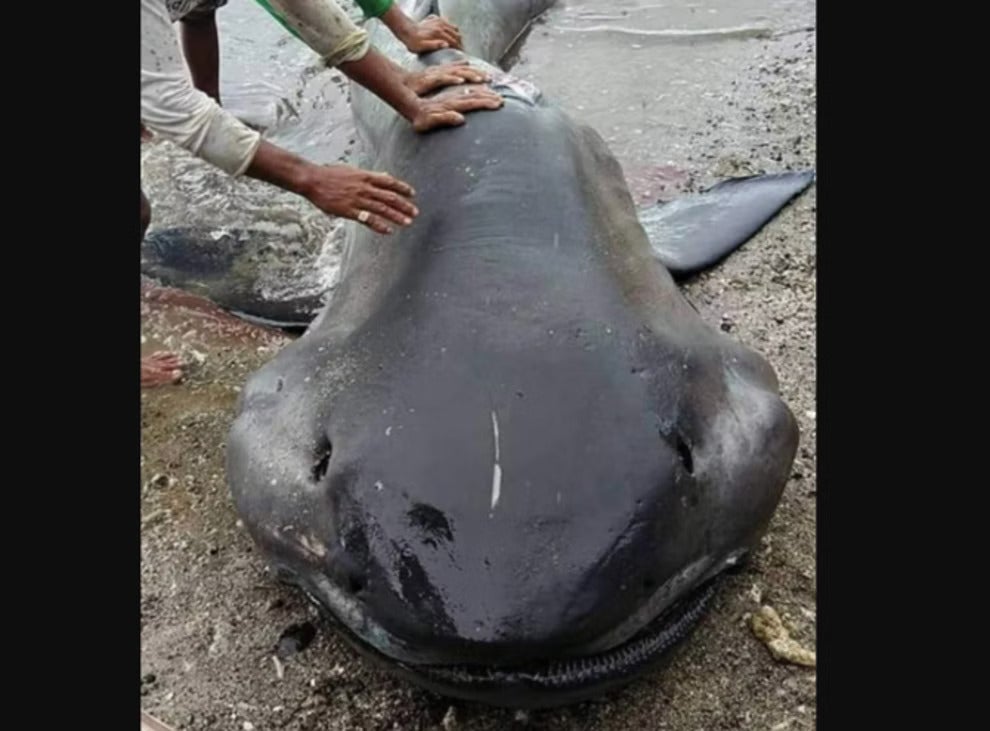Rare 15ft megamouth shark washes up on Philippines beach
Megamouth sharks live 15,000ft below ocean surfaces and their sightings are extremely rare

Your support helps us to tell the story
From reproductive rights to climate change to Big Tech, The Independent is on the ground when the story is developing. Whether it's investigating the financials of Elon Musk's pro-Trump PAC or producing our latest documentary, 'The A Word', which shines a light on the American women fighting for reproductive rights, we know how important it is to parse out the facts from the messaging.
At such a critical moment in US history, we need reporters on the ground. Your donation allows us to keep sending journalists to speak to both sides of the story.
The Independent is trusted by Americans across the entire political spectrum. And unlike many other quality news outlets, we choose not to lock Americans out of our reporting and analysis with paywalls. We believe quality journalism should be available to everyone, paid for by those who can afford it.
Your support makes all the difference.An extremely rare 15ft megamouth shark that lives deep under the ocean has been found washed up in a coastal village in the Philippines.
The dead shark was found by villagers in the remote area of Gubat in the Sorsogon province on 11 June.
Megamouth sharks can live up to 100 years and grow to lengths of about 20ft. They can live as deep as 15,000ft below the ocean surface, as a result of which there are only 269 confirmed human sightings of the fish, according to the Florida Museum of Natural History.
Local news outlet Rappler reported that photos of the dead shark were soon shared by locals on their social media, where it gained traction.
Officials from the Philippines’s Bureau of Fisheries and Aquatic Resources (BFAR) said they don’t yet know the cause of death of the shark.
BFAR spokesperson Nonie Enolva was quoted as saying that she suspected it could have been tangled in a fishing net.
Photos shared by her showed the dead shark in the shallows with locals gathered around it.
“We want to preserve it for museum material,” Ms Enolva told The Manila Times.
“We want to know and verify the cause of death of the megamouth shark. We want to preserve it either through taxidermy or submerge it through preservation solutions.”
According to National Geographic, even though megamouth sharks can be quite large – apart from their length, they weigh about 2,700 pounds – they only eat tiny prey.
“They are one of three filter-feeding shark species, and an inspection of our specimen’s stomach contents show that it ate krill, which is what we expected based on the literature,” said the magazine’s field notes from January 2019.
Megamouth sharks “are likely diurnal following swarms of krill, from the surface of the open ocean during the day, and diving deep at night,” noted the Florida Museum of Natural History.
“Megamouth, in contrast to many other deep-water sharks, shows a decrease in specific gravity in the form of a soft, and poorly calcified cartilaginous skeleton; very soft, loose skin; and loose connective tissue and muscles,” mentioned the museum’s website.
The Philippines is among the countries with the most sightings of the megamouth shark, according to nonprofit Marine Wildlife Watch of the Philippines.
It said there have been around 100 sightings of the shark in the country.
In 2015, a 14.7ft megamouth shark washed ashore in Barangay Marigondon, Pio Duran, Albay.
Most of the sightings worldwide have been reported from Taiwan.
Join our commenting forum
Join thought-provoking conversations, follow other Independent readers and see their replies
Comments